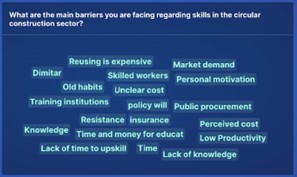Webinar - Local authorities’ policy toolkit to promote circular construction skills

Webinar - Local authorities’ policy toolkit to promote circular construction skills
On Tuesday 17th October, BUILD UP had the pleasure of hosting a webinar co-organised by BUS-GoCircular and ICLEI Europe, entitled “Local authorities’ policy toolkit to promote circular construction skills”. The purpose of the webinar was to present the main outcomes of BUS Go Circular project tailored for local authorities on how they can enhance circular skills in the construction sector and which policy levers they can activate. This was the first workshop of a series of 4 webinars to present the project’s outcomes to different target audiences.
To do so, speakers presented:
- Three resources developed within the BUS-GoCircular project: the training materials for public procurers, the guidance “Stimulating demand for circular construction skills - a guide for public authorities” and the Fundamental Training Pack for Small and Mediums Enterprises.
- The LIFE Waste 2 Build project, run by Toulouse Metropolis, and the range of actions the municipality took to upskill different target audiences.
The session began with an introduction and brief overview of the EU funded BUS Go Circular project from Leslie Petitjean, Senior Expert Circular Economy at ICLEI Europe, as a partner in the BUS Go Circular project. The main goal of the project was to develop training materials that different actors of the value chain could use to upskill their workforce.
Leslie Petitjean: "The material extraction for construction purposes has massively increased since the beginning of the 20th century. On average, it has increased by 10 times per inhabitant. Reducing resource consumption in the construction sector is key. But to make this happen, we need a skilled workforce, as for every transition."
When asked through a poll about the barriers to circular construction skills, participants stressed that the lack of time (to learn), the cost of reused materials, the old habits as the main barriers, and highlighted the need of personal motivation and political will, together with pushing public procurement for a transition towards circularity.

Helena O'Rourke-Potocki, Expert Procurement at ICLEI Europe opened the presentation of the key actions that could be undertaken by public procurers to stimulate demand for circular skills. Following Helena, Leslie Petitjean showed different examples from cities around Europe to illustrate the wide range of levers that local authorities could also use.
Helena O'Rourke-Potocki: "Public procurement is a powerful and strategic tool that public authorities can leverage to stimulate circular construction skills. As owners of many buildings and providing 25% of employment in the EU, public authorities can have a big impact on construction skills through procurement."
A second poll and Q&A session pointed out that most participants were keen to use those tools. The discussions illustrated that some cities are already involved in circular actions, such as Lahti in Finland, which has integrated training courses on circular economy in civil engineering training programs.
To illustrate how far a local authority can go by pushing skills development on the ground, Toulouse Metropolis, a French local authority, has presented the project EU-funded Life Waste2Build.
Jérémie Bernard, Project Manager in Toulouse Metropolis, introduced the territorial context and the objectives of the project. Beyond the actions on skills, Toulouse Metropolis plays a role in developing tools that help connect local stakeholders to build local materials loops.
Jérémie Bernard: "Toulouse Metropolis has signed a local charter/agreement with local stakeholders with quantified objectives. As for now, 46 projects have been selected, ranging from public schools to residential buildings. They will serve as examples to upscale good practices."
Noga Raviv, Employment project manager in Toulouse Metropolis, and Julie Verrechia from Envirobat Occitanie, a project partner, presented the actions carried out on employment and training, by paying attention to develop an inclusive approach that unemployed people could benefit from. Alongside more “traditional” training actions on circular construction, innovative actions such as Hackathons with students, Escape games… allow different target audiences to be reached out, thanks to the involvement of local partners (universities, schools, building federation, construction companies…).
Julie Verrechia: "A building company has developed a game to raise awareness on circularity to workers on construction sites who were responsible for deconstruction and materials sorting. It allowed them to become actors in this field."
The session closed with another poll and short Q&A session with actions that local authorities could consider to develop. As a key takeaway, Toulouse Metropolis encourages to work with students and the new generation, since the Hackathon that they developed with them has been the easiest and most encouraging action in the Life Waste2Build project.
To know more about other BUS Go Circular’s outcomes, please register to the webinars to come.
BUSGo_Circular_Oct 17_FINAL SLIDES.pdf
English (8.62 MB - PDF)

